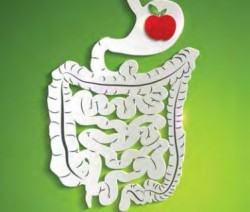Inside Matters
Get the low-down on taking care of your colon.
 Though some people don’t like to think about it, colon cancer affects nearly 100,000 men and women every year in the United States. And that’s not to mention the one million Americans estimated to suffer from inflammatory conditions like Crohn’s disease, ulcerative colitis and irritable bowel syndrome, according to the Centers for Disease Control and Prevention.
Though some people don’t like to think about it, colon cancer affects nearly 100,000 men and women every year in the United States. And that’s not to mention the one million Americans estimated to suffer from inflammatory conditions like Crohn’s disease, ulcerative colitis and irritable bowel syndrome, according to the Centers for Disease Control and Prevention.
March is National Colorectal Cancer Awareness Month, so we asked Dr. Maureen Hecker-Rodriguez, an internist at Touro Infirmary, how diet, exercise and regularly scheduled exams can benefit your colon and digestive tract. She emphasizes the importance of proactive care. “Colon cancer is preventable, and, if you keep your colon healthy, you can avoid it,” she says.
CRUCIAL COLON CARE
Create a colorful plate. One of the myriad health benefits of eating a variety of fruits and vegetables is ensuring that you get enough fiber, which helps your colon function normally. “Natural fiber in the diet is one of the most important things,” Dr. Hecker-Rodriguez says. “The fiber helps move the colon along.”
Don’t depend on juice alone. Juicing has become a popular way to get lots of nutrients from fresh-pressed vegetable and fruit juices. However, it’s pivotal not to replace whole fruits and vegetables with liquids. “You do need to eat the fruit to get the pulp and the fiber,” Dr. Hecker-Rodriguez says.
Keep an eye on timing. Sometimes, we get stopped up, but, if constipation is a regular occurrence, it’s time to see your doctor. “Get constipation investigated, instead of using over-the-counter laxatives,” Dr. Hecker-Rodriguez says. “Most people think it’s normal, but it actually indicates a higher risk of colon cancer.” This is because the longer waste sits in your body, the more likely it is to release harmful toxins or irritate the lining of the colon.
Avoid processed foods and saturated fats. “Processed food doesn’t have a lot of fiber, and you have a lot of additives and preservatives,” Dr. Hecker-Rodriguez says. These harmful substances can remain in the colon longer than natural foods, increasing the chances of internal irritation.
Stay hydrated. Drinking enough fluids — especially water — helps your body ease waste along, preventing both the discomfort and the health disadvantages of constipation.
Move around. In addition to its physical and mental health benefits, exercise aids digestion. “Exercise helps move the bowels,” Dr. Hecker-Rodriguez says. “It’s important to get some form of regular exercise at least three to five days a week.”
Supplement where you need to. Our intestines contain naturally flourishing, healthy microbes that perform a number of functions, including fighting harmful bacteria and helping us absorb nutrients from food. You can supplement these helpful microbes by eating food containing active cultures, like those found in some types of yogurt. “Probiotics are beneficial,” Dr. Hecker-Rodriguez says. “We want bacteria — we just want the healthy kind!”
Get familiar with your process. If you notice changes in the appearance or timing of your bowel movements, or other signs like dark or black stools, schedule an exam right away.
Most importantly, schedule a yearly exam with your doctor. Men and women should undergo a baseline colonoscopy at age 50; those with a family history of colon cancer or inflammatory diseases should start sooner and may need to get exams more frequently.
Don’t put off scheduling your colonoscopy out of fear of discomfort, or distaste for the preparatory solutions, called “preps,” which patients need to drink prior to examination. “If you haven’t had a colonoscopy in a couple of years, the procedure is completely different,” Dr. Hecker-Rodriguez says. “There are new preps now.” Many of these necessitate drinking less liquid. In addition, patients can undergo the procedure under a more complete sedation than in the past.
DOCTOR INFO
Dr. Maureen Hecker-Rodriguez
Crescent City Physicians
3525 Prytania St., Suite 620
New Orleans, LA 70115
(504) 894-5640
MEDICAL SCHOOL: Louisiana State University
RESIDENCY: Louisiana State University, Internal Medicine
BOARD ELIGIBLE: Internal Medicine
